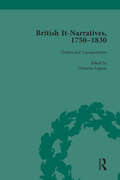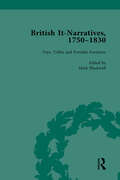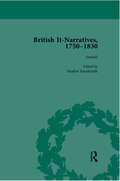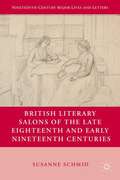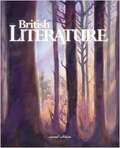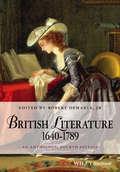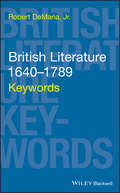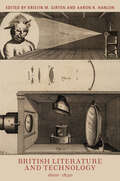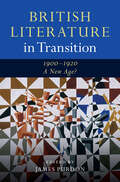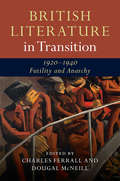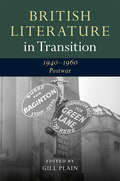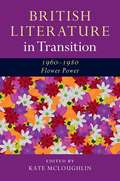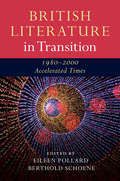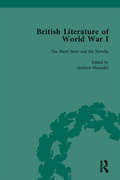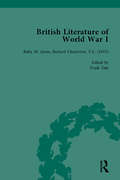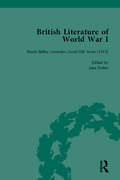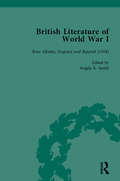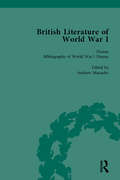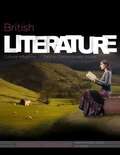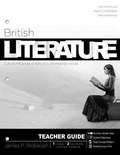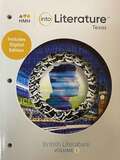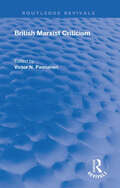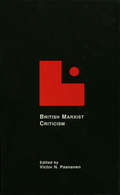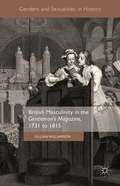- Table View
- List View
British It-Narratives, 1750-1830, Volume 3
by Liz Bellamy Christina Lupton Mark Blackwell Heathe KeenleysideIt-narratives are prose fictions that take as their central characters animals or inanimate objects. This four-volume reset collection includes numerous examples of narratives in different forms, including short stories, excerpts from novels, periodical fiction and serialized works.
British It-Narratives, 1750-1830, Volume 4
by Liz Bellamy Christina Lupton Mark Blackwell Heathe KeenleysideIt-narratives are prose fictions that take as their central characters animals or inanimate objects. This four-volume reset collection includes numerous examples of narratives in different forms, including short stories, excerpts from novels, periodical fiction and serialized works.
British It-Narratives, 1750�1830, Volume 2
by Liz Bellamy Christina Lupton Mark Blackwell Heathe KeenleysideIt-narratives are prose fictions that take as their central characters animals or inanimate objects. This four-volume reset collection includes numerous examples of narratives in different forms, including short stories, excerpts from novels, periodical fiction and serialized works.
British Literary Salons Of The Late Eighteenth And Early Nineteenth Centuries
by Susanne SchmidDuring the late eighteenth and early nineteenth centuries, British salons were veritable hothouses of political and cultural agitation, with renowned guests such as Byron, Moore, Thackeray, and Baillie. In this comprehensive study of the British salon, Susanne Schmid traces the activities of threesalonni#65533;res: Mary Berry, Lady Holland, and the Countess of Blessington. Mapping out the central place these circles held in London, this study explains to what extent they shaped intellectual debate and publishing ventures. Using a large number of sources — diaries, letters, silver-fork novels, satires, travel writing,Keepsakes, and imaginary conversations — the book establishes sociable networks of days gone by.
British Literature
by Ronald HortonBritish Literature (2nd ed.) discusses literature selections and cultural issues from eight literary periods in light of Scripture: Old English, Middle English, Tudor, Stuart, Neoclassical, Romantic, Victorian, and Modern. Traces English Christianity from its beginning to the present and studies the Shakespearean drama Macbeth.
British Literature 1640-1789: An Anthology (Blackwell Anthologies)
by Robert DeMaria Jr.Spanning the period from the British Civil War to the French Revolution, the fourth edition of this successful anthology increases its coverage of canonical writings, plays, and of the development of British Literature in the American colonies. A thoroughly updated new edition of this popular anthology which focuses firmly on the eighteenth century without neglecting the seventeenth century Contains new texts including the play Rover by Aphra Behn, and Beggars' Opera by John Gay; increased canonical works, including works by Dryden, Pope, and Johnson; and historical contextual materials, with particualr attention to the Americas Features updated introductions throughout, taking into acccount recent critical works and editions Includes useful resources such as an alternative list of contents by theme, and a chronolgy of literary and political events, providing valuable historical and cultural context
British Literature 1640-1789: Keywords (Keywords in Literature and Culture (KILC).)
by Robert DeMaria Jr.An indispensable reference for scholars and students of eighteenth-century English literature This addition to the celebrated Wiley-Blackwell Keywords series explores the meanings of fifty-eight of the most important words in British literature of the period 1640-1789. Professor DeMaria focuses on words used with frequency and urgency throughout the works of most major and several minor writers of the British Neoclassical era, with the occasional reach back to the early seventeenth century for a definitive usage found in Francis Bacon, for instance, and look forward to the nineteenth century to the works of Wordsworth, Austen, and Keats. Through discussions of words such as atom, economy, humanity, labor, machine, slavery, society, and system he reveals underlying assumptions about the way writers of the period thought about the physical and social world. Likewise, considerations of words such as happiness, passion, truth, and virtue shed light on the ethical and moral commitments of the age. Unlike dictionaries and many big-data semantics projects, this book brings forth the ambiguities, nuances, and ironies that accrued to word usages during the period through a heightened awareness of the contexts in which they occurred. Highlights and exposes the salient cultural and literary debates and metamorphic moments of cultural thought Reveals an increase in irony and a decrease in allegorical usage as an important trend in the evolution of literary language during the Neoclassical period Stresses the contexts within which words or phrases appear in order to offer a fuller understanding of their meanings and significance than available from digital databases Draws upon a vast compilation of sources from one of the most transformative eras of English literature Rigorous in its scholarship and historical reach, British Literature 1640-1789: Keywords is an indispensable resource which scholars and students of British Neoclassical literature will want to keep close at hand. It is certain to become a fixture of most university reference libraries.
British Literature For Christian Schools
by Ronald Arthur HortonTraces the development of English literature from the early Middle Ages to the early twentieth century including examples of poems, essays, plays, short stories, and religious writings.
British Literature and Technology, 1600-1830 (Aperçus: Histories Texts Cultures)
by Aaron R. Hanlon Joseph Drury Kristin M. Girten Laura Francis Erik L. Johnson Thomas A. Oldham Zachary M. Mann Kevin MacDonnell Emily M. West Deven M. Parker Jamison KantorEnlightenment-era writers had not yet come to take technology for granted, but nonetheless were—as we are today—both attracted to and repelled by its potential. This volume registers the deep history of such ambivalence, examining technology’s influence on Enlightenment British literature, as well as the impact of literature on conceptions of, attitudes toward, and implementations of technology. Offering a counterbalance to the abundance of studies on literature and science in seventeenth- and eighteenth-century Britain, this volume’s focus encompasses approaches to literary history that help us understand technologies like the steam engine and the telegraph along with representations of technology in literature such as the “political machine.” Contributors ultimately show how literature across genres provided important sites for Enlightenment readers to recognize themselves as “chimeras”—“hybrids of machine and organism”—and to explore the modern self as “a creature of social reality as well as a creature of fiction.”
British Literature in Transition, 1900–1920: A New Age? (British Literature in Transition)
by James PurdonDuring the first two decades of the twentieth century, Britain's imperial power and influence was at its height. These were years of daring, when adventurers sounded the mysteries of the deep sea and the distant poles, aviators sped through the skies, and new media technologies transformed communication. They were years of social upheaval, during which long-suppressed voices – particularly those of women, of the labouring classes, and of colonial subjects – grew louder and demanded to be heard. They were years of violence, of insurrection and political agitation, and of imperial conflicts that would encompass continents. By subjecting specific developments in literature and related culture to a fine-grained and historically-informed analysis, British Literature in Transition, 1900–1920: A New Age? explores the writing of this extraordinary period in all its complexity and vibrancy.
British Literature in Transition, 1920–1940: Futility and Anarchy (British Literature in Transition)
by Charles Ferrall Dougal McNeillLiterature from the 'political' 1930s has often been read in contrast to the 'aesthetic' 1920s. This collection suggests a different approach. Drawing on recent work expanding our sense of the political and aesthetic energies of interwar modernisms, these chapters track transitions in British literature. The strains of national break-up, class dissension and political instability provoked a new literary order, and reading across the two decades between the wars exposes the continuing pressure of these transitions. Instead of following familiar markers - 1922, the Crash, the Spanish Civil War - or isolating particular themes from literary study, this collection takes key problems and dilemmas from literature 'in transition' and reads them across familiar and unfamiliar cultural works and productions, in their rich and contradictory context of publication. Themes such as gender, sexuality, nation and class are thus present throughout these essays. Major writers such as Woolf are read alongside forgotten and marginalised voices.
British Literature in Transition, 1940–1960: Postwar (British Literature in Transition)
by Gill Plain'Postwar' is both a period and a state of mind, a sensibility comprised of hope, fear and fatigue in which British society and its writers paradoxically yearned both for political transformation and a nostalgic re-instatement of past securities. From the Labour landslide victory of 1945 to the emergence of the Cold War and the humiliation of Suez in 1956, this was a period of radical political transformation in Britain and beyond, but these changes resisted literary assimilation. Arguing that writing and history do not map straightforwardly one onto the other, and that the postwar cannot easily be fitted into the explanatory paradigms of modernism or postmodernism, this book offers a more nuanced recognition of what was written and read in the period. From wartime radio writing to 1950s travellers, cold war poetry to radical theatre, magazine cultures to popular fiction, this volume examines important debates that animated postwar Britain.
British Literature in Transition, 1960–1980: Flower Power (British Literature in Transition)
by Kate McLoughlinThis volume traces transitions in British literature brought about by the rapid, momentous and far-reaching changes of the 1960s and 1970s, illuminating a diverse range of authors, texts, genres and movements. It looks at innovations in form, considering experimental poetry, fiction and drama, and explores the literature of emergent identities in race, gender, sexuality and class. It considers changes in attitudes and in the mind itself: the growth of environmentalism, perceptions of the past, psychedelia, the sexual revolution, and information control. It examines local and regional developments, visiting Wales, Scotland, Northern Ireland and northern England. Finally, it focuses on shifts within the oeuvres of individual authors - two poets, two dramatists and a novelist: Philip Larkin and Ted Hughes, Harold Pinter and Caryl Churchill, and Iris Murdoch.
British Literature in Transition, 1980–2000: Accelerated Times (British Literature in Transition)
by Berthold Schoene Eileen PollardThe literature of twentieth-century Britain's final twenty years represents a crash course in transitional history. In the aftermath of the 1970s, the nation's hopes of becoming more efficient were high, leading to the fundamental domestic shake-up that was Margaret Thatcher's neoliberal revolution (1979–90). Following the end of the Cold War, Europe was undergoing radical rejuvenation, while the world as a whole began to thrive on new levels of connectivity and proximity brought through rapid advances in communication technology. Later, in the 1990s, Britons were asked to countenance not only internal devolution, but also the crystallisation of a brand-new European and global order. This volume shows how British literature recorded contemporaneous historical change. It traces the emergence and evolution of literary trends as well as enduring transitional shifts in genre, tone, style and thematic preoccupation.
British Literature of World War I, Volume 1
by Trudi Tate Jane Potter Andrew Maunder Angela K SmithGiven the popular and scholarly interest in the First World War it is surprising how little contemporary literary work is available. This five-volume reset edition aims to redress this balance, making available an extensive collection of newly-edited short stories, novels and plays from 1914–19.
British Literature of World War I, Volume 2
by Trudi Tate Jane Potter Andrew Maunder Angela K SmithGiven the popular and scholarly interest in the First World War it is surprising how little contemporary literary work is available. This five-volume reset edition aims to redress this balance, making available an extensive collection of newly-edited short stories, novels and plays from 1914–19.
British Literature of World War I, Volume 3
by Trudi Tate Jane Potter Andrew Maunder Angela K SmithGiven the popular and scholarly interest in the First World War it is surprising how little contemporary literary work is available. This five-volume reset edition aims to redress this balance, making available an extensive collection of newly-edited short stories, novels and plays from 1914–19.
British Literature of World War I, Volume 4
by Trudi Tate Jane Potter Andrew Maunder Angela K SmithGiven the popular and scholarly interest in the First World War it is surprising how little contemporary literary work is available. This five-volume reset edition aims to redress this balance, making available an extensive collection of newly-edited short stories, novels and plays from 1914–19.
British Literature of World War I, Volume 5
by Trudi Tate Jane Potter Andrew Maunder Angela K SmithGiven the popular and scholarly interest in the First World War it is surprising how little contemporary literary work is available. This five-volume reset edition aims to redress this balance, making available an extensive collection of newly-edited short stories, novels and plays from 1914–19.
British Literature-Student
by James P. StobaughEnjoy beloved classics while developing vocabulary, reading, and critical thinking skills! Each literature book in the series is a one-year course Each chapter has five lessons with daily concept-building exercises, warm-up questions, and guided readings Easy-to-use with suggested reading schedules and daily calendar Equips students to think critically about philosophy and trends in culture, and articulate their views through writing A well-crafted presentation of whole-book or whole-work selections from the major genres of classic literature (prose, poetry, and drama), each course has 34 chapters representing 34 weeks of study, with an overview of narrative background material on the writers, their historical settings, and worldview. The rich curriculum's content is infused with critical thinking skills, and an easy-to-use teacher's guide outlines student objectives with each chapter, providing the answers to the assignments and weekly exercises. The final lesson of the week includes both the exam, covering insights on the week's chapter, as well as essays developed through the course of that week's study, chosen by the educator and student to personalize the coursework for the individual learner.
British Literature-Teacher
by James P. StobaughEnjoy beloved classics while developing vocabulary, reading, and critical thinking skills! Each literature book in the series is a one-year course Each chapter has five lessons with daily concept-building exercises, warm-up questions, and guided readings Easy-to-use with suggested reading schedules and daily calendar Equips students to think critically about philosophy and trends in culture, and articulate their views through writing A well-crafted presentation of whole-book or whole-work selections from the major genres of classic literature (prose, poetry, and drama), each course has 34 chapters representing 34 weeks of study, with an overview of narrative background material on the writers, their historical settings, and worldview. The rich curriculum's content is infused with critical thinking skills, and an easy-to-use teacher's guide outlines student objectives with each chapter, providing the answers to the assignments and weekly exercises. The final lesson of the week includes both the exam, covering insights on the week's chapter, as well as essays developed through the course of that week's study, chosen by the educator and student to personalize the coursework for the individual learner.
British Literature: Volume 1; Grade 12 (HMH into Literature, Texas Edition)
by Kylene Beersinto Literature, Texas Edition, British Literature; Volume 1; Grade 12
British Marxist Criticism (Wellesley Studies In Critical Theory, Literary History And Culture Ser. #22)
by Victor N. PaananenBritish Marxist Criticism provides selective but extensive annotated bibliographies, introductory essays, and important pieces of work from each of eight British critics who sought to explain literary production according to the principles of Marxism.
British Marxist Criticism (Wellesley Studies in Critical Theory, Literary History and Culture #22)
by Victor N. PaananenBritish Marxist Criticism provides selective but extensive annotated bibliographies, introductory essays, and important pieces of work from each of eight British critics who sought to explain literary production according to the principles of Marxism.
British Masculinity in the Gentleman's Magazine, 1731 to 1815 (Genders And Sexualities In History Ser.)
by Gillian WilliamsonThe Gentleman's Magazine was the leading eighteenth-century periodical. By integrating the magazine's history, readers and contents this study shows how 'gentlemanliness' was reshaped to accommodate their social and political ambitions.
